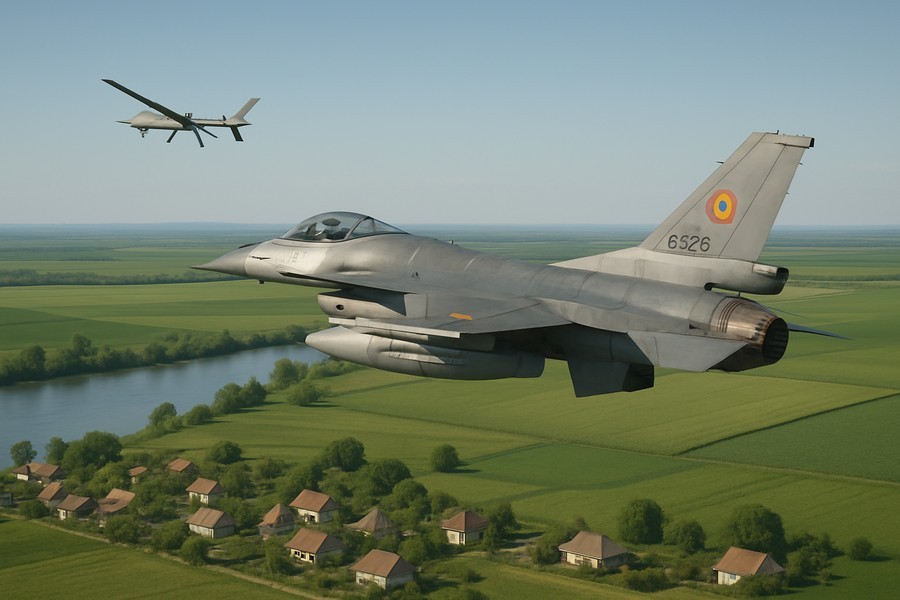
Drone Incursion in Romania's Airspace As Poland Reacts to New Attacks
Recently, Romania became the newest member of a North Atlantic Treaty Organization (NATO) to experience a drone incursion into its national airspace. This event occurred in tandem with fresh drone attacks by Russia just beyond the Ukraine border, which led to Poland scrambling its aircraft in response.
Romania's defense department disclosed that during a Russian strike on infrastructure in Ukraine, a neighboring country, its airspace was violated by a drone. Consequently, Romania deployed two F-16 fighter jets late to monitor the situation after the strikes, according to an official statement.
The jets "identified a drone within national airspace" and followed it until "it vanished from the radar" in the vicinity of the Romanian village of Chilia Veche, the statement further explained.
Expanding Drone Operations
The president of Ukraine, Volodymyr Zelenskyy, cautioned that Russia was intentionally expanding its drone operations. He urged the west to counter this with harsher penalties and more robust defense collaboration. He described the latest drone incursions as "an obvious expansion of the war by Russia." He added, "The Russian military knows exactly where their drones are headed and how long they can operate in the air."
What's needed in response, according to Zelenskyy, are new sanctions against Russia and a collective defense system. "Do not wait for dozens of 'shaheds' and ballistic missiles before finally making decisions," he warned, referencing the Iranian-designed Shahed drones Russia uses.
Ready for Major Sanctions
In the United States, the president expressed his readiness to impose significant sanctions on Russia, but only when all NATO nations have agreed to do the same and stopped purchasing Russian oil.
Also, Poland, along with its NATO partners, activated helicopters and aircraft when Russian drones attacked Ukraine close to its border. The military command of the country issued a statement stating that due to the drone threat, "Polish and allied aircraft are operating in our airspace, and ground-based air defense and radar reconnaissance systems have reached their highest level of alert."
The prime minister of Poland later announced that the high alert had been deactivated, while advising vigilance. Poland and other NATO countries have been watchful since Warsaw reported nearly 20 Russian drones entering its airspace overnight.
Escalating Tensions
Despite Russia's denial of targeting Poland, several European countries, including France, Germany, and Sweden, have heightened their support for the defense of Polish airspace. The U.S. secretary of state expressed concern about the Russian drone incursion into Polish airspace but questioned whether Poland was the intended target. "No doubt about it: the drones were intentionally launched. The question is whether the drones were targeted to go into Poland specifically," he said. If it was indeed deliberate, then it would be highly escalatory, he told reporters.
On another note, Poland contradicted the U.S. president's suggestion that the incursions might have been accidental. This disagreement from one of the U.S.'s closest European allies is uncommon.
The U.S. president revisited the issue of sanctions against Russia, stating, "I am ready to do major sanctions on Russia when all NATO nations have agreed, and started, to do the same thing, and when all NATO nations stop buying oil from Russia." Despite his repeated threats, he has not yet imposed sanctions on Russia.
Backlash from Ukraine
In Russia, an official reported that a Ukrainian drone struck one of their largest oil refining complexes, situated 1,400km (870 miles) from the frontline in Ukraine. The event sparked a fire and caused minor damage at the complex, owned by a Russian oil company, located on the outskirts of the central Russian city of Ufa.
Ukraine's military intelligence agency claimed responsibility for the attack. Since Russia started its full-scale military offensive in Ukraine, Kyiv has retaliated with attacks on Russian refineries in an attempt to limit the Kremlin's ability to finance the conflict through its fossil fuel industry.
